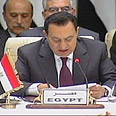
Sharm el-Sheikh once again
צילום: ערוץ 10
The Sharm curse
Past experience shows regional summits in Sharm el-Sheikh destined to fail
On Monday, Prime Minister Olmert will be heading to the "Fear Summit" in Sharm el-Sheikh, to meet with three more frightened leaders: Mubarak, Abdullah, and Abbas. Ahead of the trip, Olmert declared a "new beginning" in Israeli-Palestinian relations. Yet if Olmert wishes to turn a new leaf, Sharm is not the place for it. No Israeli-Arab summit in Sharm el-Sheikh has ever produced any results.
The most well-known and fanciest of them all took place 11 years ago, in March 1996, with the participation of all the global political top brass. Clinton came to Sharm from the United States, Yeltsin came from Russia, Chirac from France, Major from Britain, Kohl from Germany, Hassan from Morocco, Hussein from Jordan, Arafat from the Palestinian Authority, and Shimon Peres, the interim Israeli prime minister, came from Jerusalem. Egyptian President Mubarak welcomed the visitors in a dour, grim mood.
The summit's objective was to demonstrate the enlightened world's joint determination (they referred to themselves as "peacemakers") vis-à-vis…yes, you guessed it, Hamas. At the end of 1995 and beginning of 1996, Hamas' terror campaign in Israel reached its peak. Cars and buses exploded on our streets every week and caused an ongoing public opinion shock. It appeared that the Oslo agreements were collapsing, that Fatah's rule in Palestine was collapsing, and that Israelis, despite the fresh memory of the Rabin assassination, were deserting Peres in favor of Netanyahu.
Therefore, no less than 22 heads of state and ministers urgently convened in order to push Arafat into immediate military action against Hamas' terror brigades, thus saving Peres from a defeat in the polls.
The Yedioth Ahronoth newspaper's editorial estimated the summit's chances of success as follows: "The convention in Sharm will disperse and we'll be left with Hamas." And that's precisely what happened. Arafat only pretended to be fighting Hamas but in fact formed an alliance with it to scratch each other's back. Peres was defeated by Netanyahu in the elections.
The grandest Sharm summit ended with zero achievements, as was the case with the following summits. President Mubarak met new Israeli Prime Minister, Benjamin Netanyahu, in Sharm el-Sheikh in the spring of 1997. The two agreed to freeze Jewish construction in Jerusalem. Yet construction continued.
Two years later, in September 1999, Sharm hosted a nighttime signing ceremony of another agreement between Yasser Arafat and Ehud Barak, the newly elected prime minister. The US secretary of state stood next to Arafat, while Jordan's king stood next to Barak. The agreement specified the areas to be handed over to the Palestinians by Israel and set a timetable for an Israeli-Palestinian final-status agreement. It was approved in a special Knesset session but was never implemented.
The crisis in the talks with the Palestinians gave rise to another three-way Sharm meeting in the spring of 2000. The atmosphere was pleasant, smiles were wide, and palms were blistered as a result of all the handshakes. We know the rest of the story: The second intifada broke out four months later, and again, world leaders rushed to Sharm el-Sheikh to mediate between Israel and the Palestinians.
Before the summit, an agreement was reached on the wording of the statements that would be calling for an end to violence and a complete ceasefire. Yet Clinton hugged the participants a little too early. Arafat kept silent during the summit and after it, while Barak was furious and enraged. The fire did not cease, of course. Following the 2000 Sharm summit, the intifada only grew stronger.
Disarming Hamas
And so it continued, and became even worse. In May 2003, the new American President, George W Bush, traveled to a Sharm summit with Sharon, Mubarak, Abdullah, and Abbas, who was just appointed as Palestine's prime minister. With his back to the sea and facing the row of flags, Abbas delivered a sweeping peace speech.
Bush displayed sympathy to him, which made Sharon jealous. The lonely Arafat was facing house arrest in Ramallah and interfered behind the scenes. Despite his objection, Sharm 2003 saw an agreement on a detailed timetable for implementing the "Road Map." Remember the Road Map? Yes, the first clause there was disarming Hamas.
Hamas was not disarmed. The Road Map died. Arafat died as well, and Abbas replaced him. He and Prime Minister Sharon met yet again in Sharm el-Sheikh in February 2005 and renewed the nice dialogue between them. The host, President Mubarak – it's always President Mubarak – was "very encouraged."
Sharon prepared a "package of gestures" in response to Abbas' declaration that the "intifada was over" (an almost five-year delay.) It was hinted that Israel would agree to withdraw IDF forces in Judea and Samaria to pre-intifada positions. This summit also led to nothing, exactly as nothing came out of the summits that came before or after it.
Yet despite this, and perhaps in a bid to challenge fate, Israel's prime minister, the Palestinian Authority's president, and Jordan's king will again pack their bags and hopes tomorrow and travel to the "Sharm summit." The flags will be taken out of the good old Movenpick hotel's warehouse. The journalists will complain about strict security checks by Egyptian police officers. And the leaders, in the tradition of these summits, will deliver speeches, hug, sign, and make promises.
Will they able to lift the Sharm curse this time around and strike an agreement that will indeed be implemented on the ground? Will the historic promise of the 1996 Sharm summit to eliminate Hamas once and for all and bring law and order to the Palestinian Authority be realized this time? I take the liberty to doubt it; our extensive experience shows us that Sharm summits are no good.










